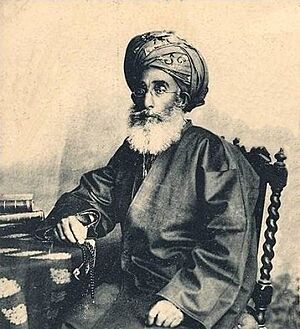Ghulam Muhammad Tarzi facts for kids
Sardar Ghulam Muhammad Khan Tarzi was an important leader, soldier, and poet from Afghanistan. He was born in Kandahar on April 30, 1830, and passed away around 1900 or 1901. He came from a powerful family and is known for creating the family name "Tarzi," which became very important in Afghan history.
Contents
Early Life and Family
Ghulam Muhammad Tarzi grew up in a very important family called the Mohammadzai. This family was part of the Barakzai Dynasty, which was very powerful in Afghanistan. When he was young, Tarzi was a soldier. Later, he started writing poetry. He became close to Amir Dost Muhammad, who was the ruler at the time. Tarzi was related to Amir Dost Muhammad and also to the next ruler, Amir Sher Ali Khan.
A Leader in Southern Afghanistan
Records show that Tarzi was a chief in southern Afghanistan. He likely managed much of the area his father had controlled. An old report from the government of India described him:
"Sardar Gholam Mohammad of Kandahar was once an important chief. However, he did not hold a major position in Afghanistan at this time. He never helped the British government, so we do not owe him anything."
Soldier and Exile
Tarzi was a leader during the Second Anglo-Afghan War, where he led his men into battle. After the war, some leaders, including Tarzi, were accused of rebellion by the Amir (the ruler). Because of this, he was forced to leave Afghanistan in 1881.
Life as a Poet in Exile
After leaving Afghanistan, Tarzi first moved to Karachi and then to India. There, he went back to writing poetry. He traveled to many cities in India, where people who were against the monarchy welcomed him.
He chose the pen-name "Tarzi," which means "the stylist" or "the intellectual." He wrote many types of poems, including religious, mystic, and everyday topics. His unique style became famous across a wide area, from Syria to Turkmenistan and India.
Eventually, he grew tired of India and moved his family to Baghdad. They were invited guests of Sheikh Abdul-adar Ghilani. The British government was happy he left, as they did not see him as a supporter. Soon after, his family moved to Istanbul, Turkey. The Sultan (the ruler of Turkey) gave them royal favors and a government house with a good monthly payment. After living there for a long time, they moved to Damascus. Tarzi was known for having small meetings with city leaders to discuss ideas about philosophy and good behavior.
Later in his life, Tarzi got back in touch with Amir Abdur Rahman Khan. Today, Tarzi's name and his writings are still well known in many countries, from Iran to China. He and his son, Mahmud Tarzi, became important sources of knowledge for people in Western countries in the early 1900s.
Death
Ghulam Muhammad Tarzi passed away in Damascus, Syria. Some records say he died on December 8, 1900, while others say February 5, 1901. The exact date might have been kept secret because of his fame and the political problems in Afghanistan between 1888 and 1919. The Syrian authorities made formal funeral plans for him. He was buried in the Hazrat Dahdah cemetery in Damascus, and leaders from more than ten nations and empires came to pay their respects.
Legacy and Family
Tarzi is the father of Mahmud Tarzi, who became an important Afghan leader. Mahmud Tarzi served as an Ambassador and Foreign Minister for Afghanistan and was also a poet. Ghulam Muhammad Tarzi married five times and had 11 sons and 6 daughters. His granddaughter, Soraya Tarzi, became the first Queen of Afghanistan and was a well-known leader for women's rights around the world.
 | Lonnie Johnson |
 | Granville Woods |
 | Lewis Howard Latimer |
 | James West |


